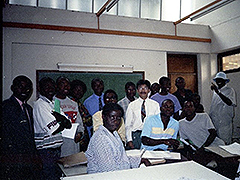Name: Kazuhiro Kato
Batch: FY1997-1 (Jul 1997 - Jul 1999)
Technical Field: Architecture
Host Organization: Ministry of Public Works
Hometown in Japan: Kaminoyama City, Yamagata
A Piece of Memory: "Large Top Light in the Classroom"
The Southern Region Administration, an agency of the Ministry of Public Works and Supply, is in Blantyre, a city neighboring Zomba, the former capital of Malawi. Including Limbe, a neighborhood located in the central part of Blantyre, this is the country's most populous city with a population of one million people. Located here is JICA's office with a dormitory attached to it, and Blantyre was a larger and more vibrant city than the capital, Lilongwe (is it still the same now?).
It was here that I spent the last day of field training, along with a homestay, before my assignment. It was also from here that new JOCV members departed for their new posts.
Blantyre is home to the University of Malawi (The Polytechnic), which has the only architecture department in the country. It is the highest educational institution in the field of architecture. At the request of the university, a JOCV member (myself) was assigned to the second position of the architecture department as a lecturer. There were twists and turns, but in addition to the head of architecture department, who had been a lecturer for some time, it so happened that there would be one other person to serve as a lecturer.
I oversaw first-year students, teaching "Design" and "Planning." There were two lectures (exercises) for two periods a week on the two subjects. The first-year students were of diverse age groups, ranging from 18 to 30 years old. These students' ages are quite different, but it is no wonder, as they must save up money before taking the entrance exam. Unless you are not from a wealthy family, you will not be able to enter the university right after high school. If you do not work to earn money for your education, you cannot enter the university. There is no scholarship system in this country.

With students studying under a big top light
Pencils, rulers, and other drawing tools are loaned by the university. The classrooms are lined with drafting tables, and students can only draw in the classroom. There is no drawing board (table) at home (meaning that they cannot afford it). Students draw as much as they can in the classroom.
The classroom has a very large top light. The students would be drafting under the light that poured down from there. Even though this is the biggest city in Malawi, the power frequently goes out, including planned power outages. When the power goes out, it is dark. If it is dark, it is difficult to draw fine lines.
What ingenuity! It is the ultimate in ecology. Whether the power goes out or not, students can study under the uniform light. It was a moment of great admiration and recognition that the Malawian lifestyle of "getting up when the sun rises and going to bed when the sun goes down" also existed here.
It was difficult to explain the concept of design to students who had not been taught the concept in secondary school (middle school / high school) and had never used a ruler, but they all worked very hard.
On evenings when I had classes, I went to a kanyenya (an open-air barbecue stall) with my students. They drink, they talk, and they are all cheerful. They are the architects of tomorrow.
I wish them all the best.
Next will be a piece of memory of Mr. Hiroshi Onishi (science and mathematics teacher), a JOCV member of Batch FY1994-1, who published "Malawi Dayori (Malawi Newsletter)" for two years during his term of service.





scroll